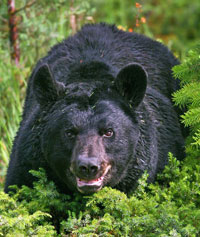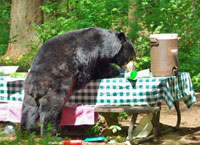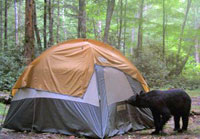Bear Facts
 Hiking and camping restrictions are occasionally in effect as a result of bear activity. Safe traveling in bear country begins before you get on the trail. Learning about bears before you come to the forest can help you avoid a confrontation.
Hiking and camping restrictions are occasionally in effect as a result of bear activity. Safe traveling in bear country begins before you get on the trail. Learning about bears before you come to the forest can help you avoid a confrontation.
Black Bears
Black bears come in a variety of color phases including black, brown, and cinnamon (reddish or blond). Although grizzly bears were once found throughout much of the western United States they now have a very limited range. Only black bears are currently found throughout most of the United States.
Black bears occupy most pine forests and chaparral (brush) zones: however it is not uncommon for black bears to wander into lower elevations. Black bears vary greatly in size and weight. Adult bears vary in weight from 125 to 450 pounds or more and male bears are usually larger than females of the same age. When on all four legs, black bears measure about three feet high at the shoulders and when upright on their hind legs, they may approach five to six feet tall. Black bears are known to live up to 20 years of age in the wild. They are very agile, are good swimmers, climb trees very well and can run at speeds of up to 35 mph.
When People and Black Bears Meet
 Conflicts may arise when humans and black bears occupy the same area. When visiting or living in black bear country, it is always important to be aware of the potential of encountering a bear and to take every precaution to reduce conflicts. Although injury to humans by black bears is rare, it is always a possibility. Your behavior in bear country could affect your safety, the safety of others, and could even save the life of a bear. Remember, "a fed bear is a dead bear."
Conflicts may arise when humans and black bears occupy the same area. When visiting or living in black bear country, it is always important to be aware of the potential of encountering a bear and to take every precaution to reduce conflicts. Although injury to humans by black bears is rare, it is always a possibility. Your behavior in bear country could affect your safety, the safety of others, and could even save the life of a bear. Remember, "a fed bear is a dead bear."
Most conflict between people and bears arise as the result of food. Human foods, human garbage and even pet foods are attractants to black bears. Eliminating access to foods can reduce conflicts. Your actions may prevent an injury and the need to destroy a bear.
- Never camp in an area that has obvious evidence of bear activity such as digging, tracks, or scat.
- Keep your camp clean.
- Never leave human food, pet food or garbage available and unsecured.
- Do not cook in your tent or sleeping area.
- Store all foods, toiletries, and other scented items well away from sleeping areas and unavailable to bears.
- Wash up, change clothing and remove all scented articles before retiring to your sleeping area.
- Most backcountry campsites have food poles from which all food, cooking gear, and scented articles must be suspended when not being used.
- Treat all odorous products such as soap, deodorant, or other toiletries in the same manner as food.
- Do not leave packs containing food unattended, even for a few minutes. Allowing a bear to obtain human food even once often results in the bear becoming aggressive about obtaining such food in the future.
- Sleep a minimum of 100 yards (91 meters) from where you hang, cook, and eat your food. Keep your sleeping gear clean and free of food odor. Don't sleep in the same clothes worn while cooking and eating; hang clothing worn while cooking and eating in plastic bags.
What to Do If You Meet A Black Bear
 Every encounter with a black bear can be different, however, bears should always be considered unpredictable and dangerous. More often than not, a wild bear will detect you first and flee from the area. However, black bears that have become accustomed to humans and their foods may not run away. In these cases, certain precautions are offered for consideration
Every encounter with a black bear can be different, however, bears should always be considered unpredictable and dangerous. More often than not, a wild bear will detect you first and flee from the area. However, black bears that have become accustomed to humans and their foods may not run away. In these cases, certain precautions are offered for consideration
- Do not run. Remain calm, continue facing the bear and slowly back away.
- Keep children and pets close at hand.
- Make lots of noise. Yell, rattle pots and pans, whistle and break sticks.
- Travel in groups.
- Stand upright. Do not kneel or bend over. Wave arms, jackets or other materials.
- Never approach or corner a bear.
- Never offer food to a bear.
- Be aware of the presence of cubs and never come between a bear and its cubs.
- Fight back aggressively if a bear attacks you.
If you are involved in a conflict with a bear, regardless of how minor, report it to a Forest Service employee as soon as possible. Another's safety may depend on it.
Learn more:


